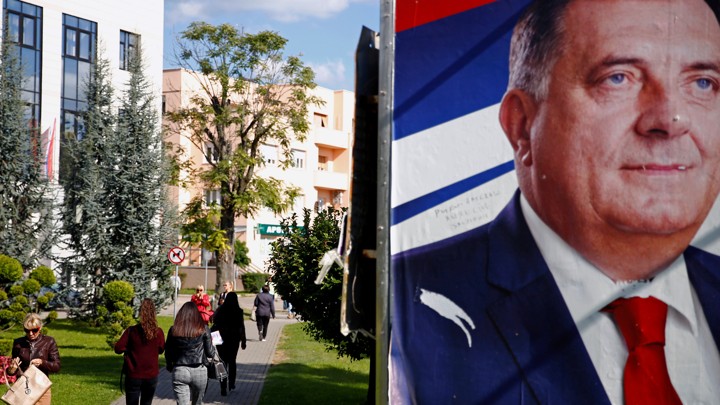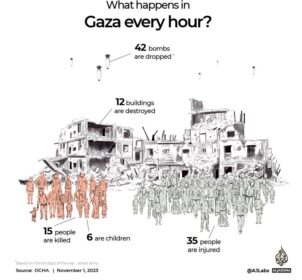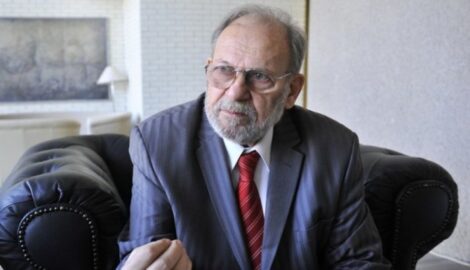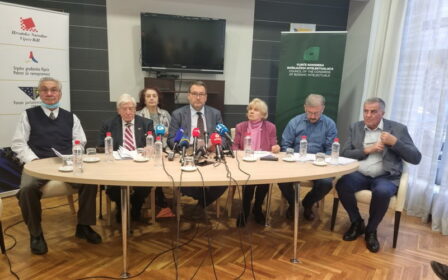The President Who Wants to Break Up His Own Country

People pass by Milorad Dodik's pre-election poster in Banja Luka, Bosnia and Herzegovina, September 26, 2018. REUTERS/Dado Ruvic - RC13420F1A10
SARAJEVO—Few national leaders would call their own country an “impossible state.” Fewer still would actively advocate for it to be broken up. Almost none would risk a decades-old peace accord to do so. And then there is Bosnia’s Milorad Dodik.
“I am a Serb … Bosnia is only my place of employment,” Dodik proclaimed just a day after his inauguration as Bosnia’s head of state. A Serb nationalist, he has publicly called for the statelet he comes from, Republika Srpska, to break away from Bosnia. And, as Bosnian president, he has said he will not use his Bosnian passport for overseas travel. It’s these kinds of outbursts—almost Trumpian in their ability to provoke—for which he has become notorious.
The story of Dodik’s rise is one of a far cannier political operator than his brash public image might suggest. He was once hailed as a “breath of fresh air” by Madeleine Albright; she, like others, hoped he symbolized a clean break from the war criminals who had ruled the territory. Two decades on, though, he is seen as a nationalist enfant terrible threatening a fragile peace. What changed, and how?
In some ways, Dodik’s story is a familiar one, that of a politician changing his stripes when the moment suits, and courting Russia as an ally. But here in Bosnia, the stakes are higher, not just for the people who live here, but for the legacy of a significant American foreign-policy achievement, too. By taking aim at the Bosnian state, Dodik is, in effect, targeting the Dayton Accords, one of the signature peace deals of the 20th century. When signed at an American air base in 1995, the agreement ended what had been Europe’s most devastating conflict since the Second World War, one which had cost more than 100,000 lives. (Unsurprisingly, Dodik’s threats to undermine the accords have earned him U.S. sanctions.)
The Dayton Accords left all sides dissatisfied and nurturing grievances, but brokered a brittle peace. In the process, they shaped modern Bosnia—the country’s entire constitution is an annex of the document—by cleaving it into two ethnically based “entities” of roughly equal size. These are the Federation of Bosnia and Herzegovina, home predominantly to Bosniaks (Bosnian Muslims) and Bosnian Croats, and the Bosnian Serb–dominated Republika Srpska. Both entities have their own president, their own prime minister, and the trappings of extensive autonomy, with a weak central government in the federal capital Sarajevo presiding over them. There is no hard border, but Bosnia’s various communities largely live separate lives.
Besides the country’s presidency, Dodik has also for the past eight years led Republika Srpska, which encompasses much of the country’s north and east (Republika Srpska should not be confused with Serbia, a separate country with whom its people share ethnic, linguistic, and religious commonalities). He appears to have grand designs for the territory: like many Bosnian Serbs, Dodik views Republika Srpska as a state-in-waiting, whose full sovereignty is stymied only by the Dayton Accords, which clearly forbid its often postponed secession from Bosnia.
In October, Bosnians elected three members of the country’s presidency, each representing its main ethnic groups; the chairmanship of the presidency rotates between the trio. For the next eight months, it’s Dodik’s turn in the driver’s seat, and he has started in predictably inflammatory style. Before his inauguration in November, Dodik brought the flag of Republika Srpska to Sarajevo, where he planted it outside his new office in the presidency building. The act seemed calculated to spark anger, given that Republika Srpska has flirted with secession more than once. Politicians from the Bosniak and Croat communities demanded that the flag be removed. Dodik not only stood firm but upped the ante: If Republika Srpska’s flag was not displayed in the building, he said, he would refuse to hold presidency sessions.
Beyond that bellicosity, Dodik is taking legislative steps to further his cause, too. A new reform package consolidates even more powers in Republika Srpska’s hands. For example, the statelet might get its own intelligence service alongside its burgeoning, militarized police force.
Banja Luka, a Serb city in northern Bosnia, flaunts its alter ego as the capital of this state-in-waiting. The red, blue, and white flag of Republika Srpska is ubiquitous here; few Bosnian flags grace its streets, and the city’s museum and theater are proudly prefixed with the word national.
“Many young people in Republika Srpska today have no conception of any other political reality,” remarks Miloš Šolaja, a political-science professor at the University of Banja Luka, adding that some of his students had never even been to Sarajevo. “This mental geography is very strong; it’s as if there’s an iron curtain in the brain.”
This part of what is now northern Bosnia is where Dodik cut his teeth; he grew up in Laktaši, a town of 35,000 just north of Banja Luka. He played for the local basketball team and went on to lead the municipality during the twilight of socialist Yugoslavia. Locals are proud of their prodigal son. “He protects Republika Srpska,” said a resident, Branka Trninić, at a bus stop. “I admire his energy and resolve.”
“Dodik is the only politician I remember seeing on billboards as a kid, and whose face remains on them today,” says Ljupko Mišeljić, a 22-year-old student. That longevity may be thanks to Dodik’s capacity for reinvention.
He first came to power as Republika Srpska’s prime minister in 1998, in opposition to the war criminals then holding sway over the territory. In subsequent years, Dodik had some success in cleaning up Republika Srpska’s image, offering to cooperate with war crimes tribunals and hand over war criminals.
“Milorad Dodik was indeed a breath of fresh air,” says Valentin Inzko, the high representative for Bosnia and Herzegovina, speaking in his office in Sarajevo and referencing Albright’s characterization. Inzko and his team are tasked by the international community with ensuring adherence to the Dayton Accords and that Bosnia does not descend again into violence.
But before long, the Serb’s stance was changing. “Dodik has said … publicly that when he used moderate, constructive speech, nobody supported him, that he switched because in order to gain votes, you have to use ethnic, nationalist rhetoric,” Inzko told me. “In a way, he was right: Since then, he has won every election.”
By 2013, Dodik was defending Radovan Karadžić, a former leader of Republika Srpska who was found guilty by an international tribunal of committing genocide at Srebrenica, where thousands of Bosnian Muslims were killed. When a new student dormitory in the town of Pale was named in honor of Karadžić in 2016, Dodik unveiled the plaque bearing Karadžić’s name. The Bosnian leader has also frequently clashed with Inzko and his predecessors. (Neither the office of the Bosnian presidency nor Dodik’s political party, SNSD, responded to multiple requests for comment.)
Dodik isn’t just fighting battles at home, either. While he supports Bosnia’s bid to join the European Union, he is opposed to the country joining nato, which decided last month to start a membership action plan for Bosnia. It’s no surprise, then, that Dodik is characterized in the West as pro-Russian, a label he flaunts. In March, he welcomed the Night Wolves, a pro-Kremlin biker group, to Bosnia, and in October even called for Republika Srpska to recognize Russia’s annexation of Crimea. These ties with the Kremlin are becoming more and more formalized: The weekend after bringing his flag to Sarajevo, Dodik headed to St. Petersburg to open Republika Srpska’s trade legation in the city.
Russia’s ties to Dodik need not be such a cause for alarm, argues Dimitar Bechev, the director of the European Policy Institute—a think tank based in Sofia, Bulgaria—and the author of a book about Russia’s role in the Balkans. In an email exchange, Bechev noted that Moscow’s influence over Dodik means the Kremlin also has the ability to restrain him. For now, though, the Bosnian president’s ties to Russia appear to be paying off for him politically, allowing him to show that he has Moscow’s blessing. As a result, there are few serious challengers to the tight control he and his allies have over Republika Srpska today.
Dodik also has Bosnia’s political setup to thank for amplifying his success. Many analysts of Bosnian politics now believe that Dayton may have facilitated the rise of its loudest detractor: By institutionalizing ethnicity on every level of government, Bosnia’s political structure works against politicians who try to appeal across ethnic divides. As one major study of Dodik’s political language put it, his “rhetorical politics is made possible by the unresolved legacy of the Bosnian War.”
The response to one case in particular is instructive. In March, David Dragičević, a 21-year-old man, was found dead in Banja Luka. The local authorities insisted that his death was an accident; Dragičević’s father suspected murder, accusing the police and prosecutor’s office of protecting his son’s killers. A protest movement was born, under the name Pravda za Davida (“Justice for David”), holding daily vigils and railing against an official culture of impunity. But the protests failed to become a real political movement capable of challenging the authorities. Local officials who showed support for the protests said they quickly found themselves demoted after Dodik’s election win in October.
On Christmas Day, the Bosnian leader’s allies in Banja Luka went on the offensive; police cracked down hard on the protest movement, cordoning off a square in the city center where vigils for Dragičević had been regularly held. Several opposition politicians, journalists, and protest leaders, including Dragičević’s father, were detained. Standoffs between the police and remaining protesters continue.
Some vocal Bosnian Serbs complain of a “siege mentality” eagerly encouraged by the authorities and a pliant local media. “Dodik turned our frustration during the 1990s into conspiracy theories, which paralyze any rational discussion about the country’s current situation,” explains Srdjan Puhalo, a Banja Luka–based psychologist and popular blogger who covered the protests from the start. “Those who want a strong leader vote for him, and those who don’t simply leave.”
Šolaja, the University of Banja Luka professor, says this is not an accidental response to events. “At first I thought [Dodik] was just good at improvising, but now I get the impression that there’s some system [to his provocative statements].”
There certainly is a system: Dodik’s media savviness has blossomed into a multimillion- dollar PR operation. Not only did his party hire two former Trump campaign associates as lobbyists, but the Republika Srpska government has spent tens of millions of dollars on lobbying in the United States, reportedlyamong the highest such figures in Europe. Dodik may well be aiming to bypass international representatives in Bosnia, such as Inzko, and appeal to Washington directly, or he could be trying to remove the American sanctions against him (which the outgoing U.S. ambassador to Bosnia has confirmed will remain).
“This was something Dodik and other Bosnian politicians learned long ago, but was only mentioned in Western politics recently: that elections are won by emotions, not by issues,” says Srećko Latal, a Bosnian political analyst. “For many years, we’ve been told that Bosnia has been falling behind the West,” he adds, “but it’s actually ahead of the curve.”
We want to hear what you think about this article. Submit a letter to the editor or write to letters@theatlantic.com.
MAXIM EDWARDS is a British journalist covering Central and Eastern Europe and a former editor at openDemocracy and OCCRP.



